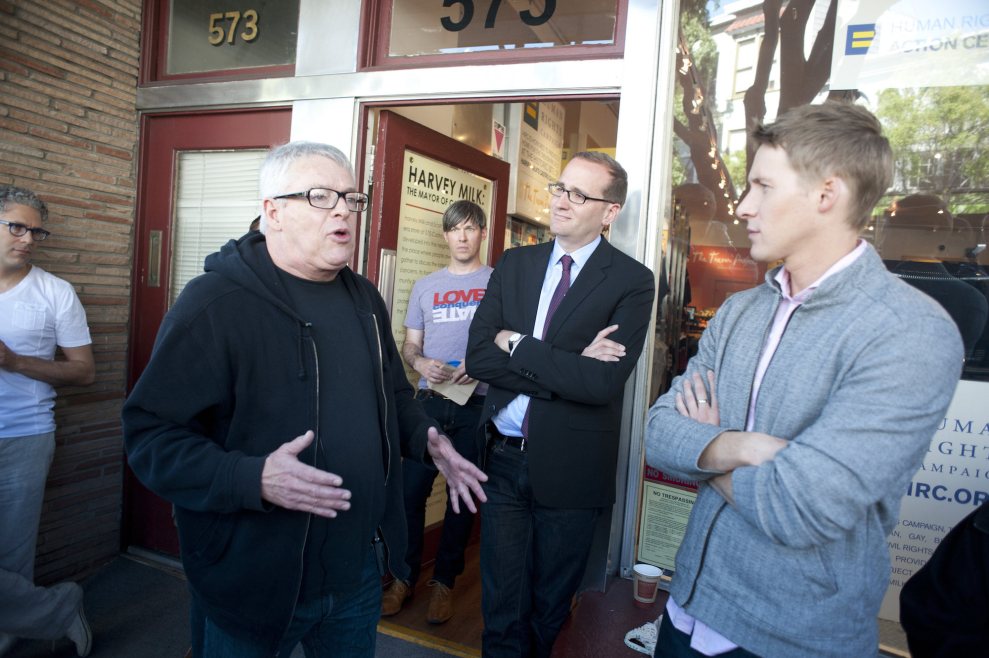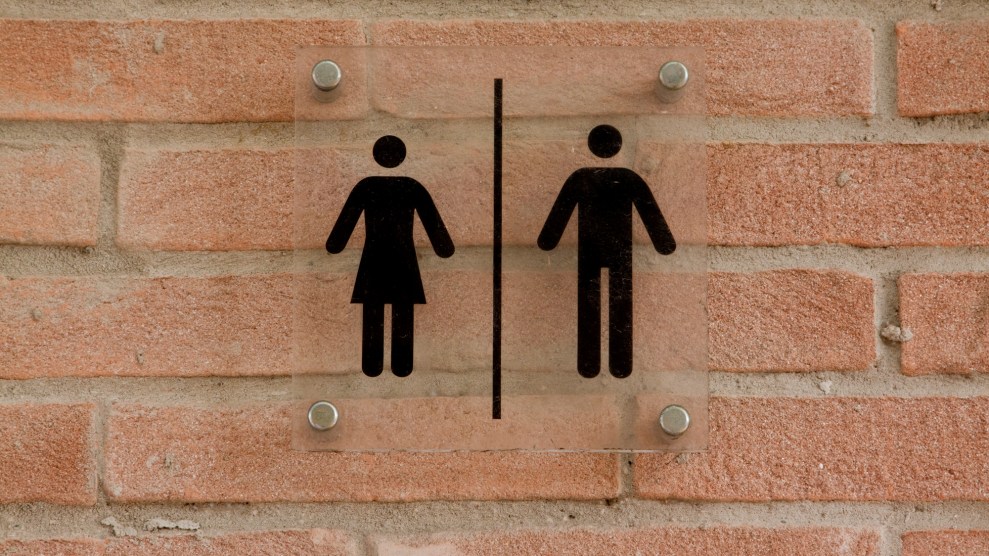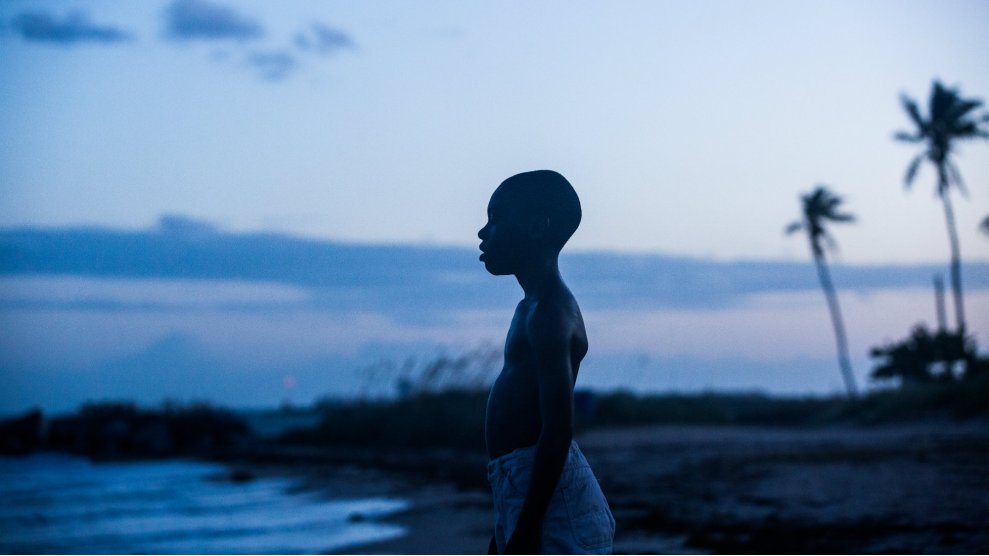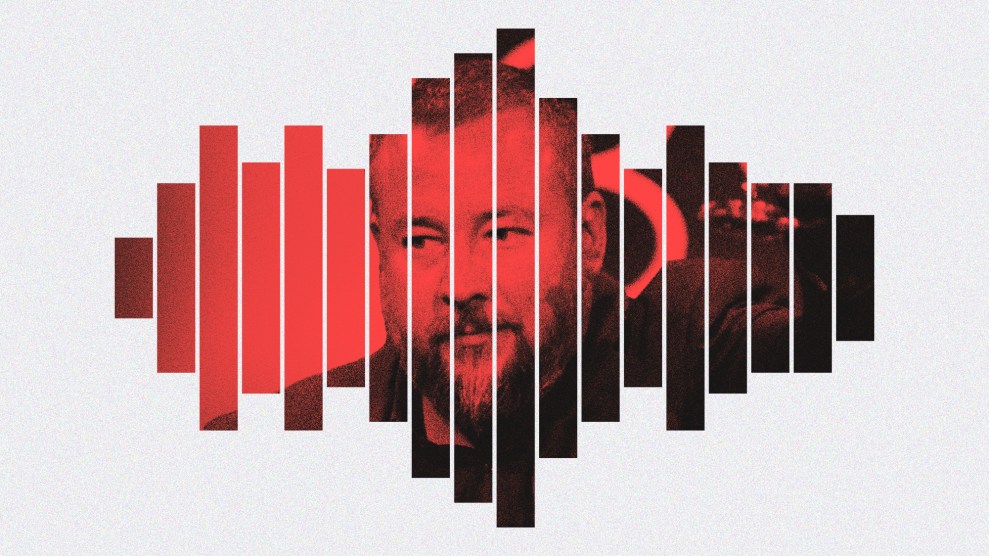
Cleve Jones talks to "When We Rise" screenwriter Dustin Lance Black, while Chad Griffin, president of the Human Rights Campaign, looks on.Mark Murrmann/ZUMA
I’m sitting with Cleve Jones, the legendary gay-rights activist, at an outdoor table at Café Flore in San Francisco’s fabled Castro district on one of those mythical fall afternoons for which Bay Area residents willfully shiver through the summer. Jones, who has a new memoir and a forthcoming ABC miniseries based on his life, has been through all kinds of hell in his days. And yet, here he is at 62, alive and happy.
Jones arrived in San Francisco in the 1970s as a teenager and was taken under the wing of the late Harvey Milk, the city’s first openly gay supervisor. In the 1980s, as the gay community was decimated by the AIDS epidemic, Jones launched the NAMES Project AIDS Memorial Quilt. A moving remembrance of those who died, the quilt became the largest piece of folk art ever created. His memoir, When We Rise: My Life in the Movement, is an ambrosial read, masterfully interweaving major historical events with juicy personal details of romance and heartbreak. The miniseries of the same name, from Oscar-winning screenwriter Dustin Lance Black and executive producer Gus Van Sant, is due to air in February.
Café Flore is one of Jones’ habitual haunts—the book sequence in which he learns of Milk’s murder by fellow supervisor Dan White commences with him seated at a nearby table. We’re barely a block from Milk’s old camera store on Market Street—now a seafood restaurant that, if you know where to look, still has the old “Kodak 24 hour development” sign. “One time I saw what I thought was an old man stagger across the crosswalk there and sink to his knees and die,” Jones tells me, pointing to a spot just behind where we’re sitting. “When I went over to try to assist him, I realized it was a neighbor of mine who was 27 years old. He died on the sidewalk in front of me from AIDS.”
Jones was diagnosed with HIV in 1985 and nearly died of AIDS himself. Despite Jones’ good cheer, our conversation steers somber as we discuss the striking changes taking place in San Francisco and the state of the continuing epidemic. But for each worrisome observation, Jones also harbors hope, and back comes his smile. He still dedicates his time to organizing and activism, which are as urgent now as ever, he says. After all, he doesn’t play golf, and besides, “the movement saved my life.”
Mother Jones: Early on in your memoir, you mention that it was tough to scrape together rent money in 1970s San Francisco. That seems quaint now. Would the gay-rights movement even have been possible in today’s San Francisco?
Cleve Jones: No. The reality is that the “gayborhoods” are going away. It’s because of many factors, including the internet and increased acceptance, but mostly it’s the cost of housing. So kids like me back then can’t come here. Where would the radicals live? Where would the young poets live? They’re all gone. And even the older people who were part of that time are being forced out.
MJ: How has that influenced the political landscape?
CJ: You see it in the simple fact that this district once represented by Harvey Milk is now represented by Scott Weiner. The only thing he has in common with Harvey Milk is that he’s gay. His politics are the opposite of Harvey’s! He’s a corporate tool. He’s financed by anti-union forces like the charter schools. So it’s disheartening, and I don’t know where people are going. When you lose the gayborhoods, you lose the political power that comes when you’re concentrated in precincts, and you also lose the cultural vitality. This is the neighborhood that gave us the rainbow flag, the first gay marching band, the first gay men’s chorus, the AIDS memorial quilt, the Sisters of Perpetual Indulgence.
You also lose the specialized social services that are so important for our most vulnerable—our youth, our seniors, people with HIV, transgender individuals. Who cares for them if they’re displaced to Richmond or Stockton? Unfortunately, the conversation about this usually gets reduced to me complaining about too many straight guys in the gay bars. But there’s probably a third as many gay bars as there were in the ’70s. There’s not a single venue in the whole city for lesbians. There used to be a dozen. The main thing driving that is the incredible cost of living here.
MJ: Your campaigns went to some lengths to incorporate the identity politics of the gay community and also the class politics of the labor unions, the anti-war movement, etc. As the gay community has become more accepted, do you see the solidarity with those movements being pulled apart?
CJ: Absolutely. I don’t even want to go to the Pride marches anymore. The politics have been removed almost entirely. They’re just huge corporate showcases—I think even Walmart was in last year. It makes me cringe.
Part of what you’re talking about is a much bigger issue than just the LGBT community. When I was young, I think all of us viewed the LGBT struggle as broader struggle for peace and social justice. To be for LGBT rights required one to also be actively in opposition to war, to racism, to poverty—and to understand those connections. And I think that we saw ourselves as queer people who maybe had a special gift in that we were born into every color of skin and every faith and every ethnicity, and so maybe we could be bridge builders within the progressive movement. To a very large extent that’s been lost.
MJ: Do you think the new emphasis on identity politics has changed activism on the left?
CJ: I think it’s why we’ve been so ineffective. We’re increasingly putting each other in these silos where there’s just this circular firing squad. We spend countless hours talking about people’s feelings and issues that aren’t going to change anything. What’s missing from so much of it is a class analysis. A whole lot of the way identity politics has gone seems to me to deny empathy. If you tell me I can’t understand you because of my color or you can’t understand me because of your sexual orientation or she can’t understand us because of her faith, well, if you can’t have empathy how will you ever have solidarity? I work mostly today in the labor movement.
MJ: How do you think the housing crisis got so bad in various cities?
CJ: It’s because the whole function of cities has been transformed. What people haven’t quite grasped yet is that the rich are transforming cities all across the world. Since the industrial revolution, cities, and especially the inner cities, were the places for the newly arrived. Voluntary immigrants seeking economic betterment, refugees, the bohemians, the artists—all of those people were crammed into densely populated neighborhoods and tenements. And as people climbed up the economic ladder they moved out, which really accelerated with the “white flight” phenomenon in the ’60s and ’70s. I hear people say, “Well, Cleve, you should shut the fuck up; what these new arrivals are doing to you is exactly what you did to the working class Irish and Scandinavian people who lived in this neighborhood before.” And that’s a lie! When I arrived here, the population of San Francisco had been declining for three decades.
When my friends and I arrived in this neighborhood, the old Irish and Scandinavian families were eager to get out of these cramped, drafty old buildings and move to San Mateo or Marin. They profited from our arrival because their apartments that had been empty for years and were shabby and falling apart were suddenly being rented to gay men who were piling in and redecorating and painting. So they were happy, they made a lot of money—that’s not what’s happening now. Then in the late ’80s and into the ’90s people began piling back into the cities, but it was the rich who wanted the amenities on offer in the gayborhoods. When the rich reclaimed these areas, they didn’t want to be next to a gay bar where people are drunk and loud, pouring out at two in the morning. San Francisco is a warning of how extreme those changes can be and how really damaging, because middle-class people can’t work here anymore.
MJ: What would you do to protect gayborhoods?
CJ: It’s not just the gay neighborhoods, of course. We’ve already lost most of the Filipino community, the Latino community is being removed, the African American population has been reduced from 15 percent in the ’70s to officially like 4 or 6 percent—but it’s less than that. So it’s not by any means just an issue for the LGBT community. I think the solutions are clear. The city government has to say to developers, “If you’re gonna build units for the rich, you’re gonna build units for the poor. Period.” If we had a mayor and a board of supervisors not owned by the developers and the tech giants, we could do that. There are places in this country that have not just protected middle-class neighborhoods but reduced homelessness. Even places like Houston have been able to reduce homelessness among veterans. It’s a pretty shameful situation.
The new people that are moving here, even in the unlikely event they plan on staying and having a family, their kids are never going to need community college—they’ll go to Stanford. They take their private fleet of buses back and forth to Silicon Valley, so why would they be interested in supporting bond measures to rebuild public transportation; they don’t use that, they sneer at it. I’m not going to say all the new arrivals are selfish and greedy, but a significant number are.
MJ: We’ve seen some major victories recently for gay rights. Do you ever feel like you’ve done your job and are ready to retire?
CJ: Hello! The world is a mess! I don’t have any hobbies! I don’t golf, I can’t imagine what I would do if I retired other than get fat. I enjoy the mechanics of organizing, and I like winning tangible victories, so when my union Unite Here wins, the women who work so hard to clean those rooms in those downtown hotels go home with more money in their pockets and they work in safer conditions and they have access to better health care and their kids go to better schools and they’re treated with more respect by their bosses. Those are victories that are really exciting. People’s lives can be transformed by the movement. That was my hope for the book. I wanted to write about the movement that actually did save my life. That’s not hyperbole. I would be dead. I would’ve killed myself at 15 if I hadn’t read about it.
MJ: Do you feel disheartened about the decline in student activism over time?
CJ: It’s very different now. But I see glimmers of hope. I saw it in the Occupy movement, I see it in Black Lives Matter. I saw great hope in the Sanders campaign—a flawed candidate, not perfect, but pretty damn close. Millions of young people were inspired by him. I recently heard young people talking about collective bargaining agreements—I hadn’t heard young people use that phrase in forever!
MJ: Most Americans don’t think much about AIDS anymore. How would you assess the problem these days?
CJ: There’s an ongoing pandemic—it’s a global crisis. Most people do not have access to medication. The sense of urgency has almost completely vanished. The subset of our population that has not benefited from the advancement of medication is black and brown people. I think that a big part of the energy that was going into fighting AIDS was reduced when we saw that more of the new infections were among our black and brown young people. That’s a sad truth to have to claim, but I believe it’s true. The majority of new infections in this country are among young gay and bisexual men of color, and the full resources that could be brought to bear simply are not.
MJ: What’s the status of the AIDS Memorial Quilt?
CJ: It’s largely forgotten and lives in a warehouse in Atlanta. The people who control it seem to have little imagination, and less urgency. I’m very frustrated with them. I’ve given up on it. I think most young people are completely unaware of it, even though in its time it was the largest community arts project in the world. When I came up with that idea, everyone told me that it was the stupidest idea they’d ever heard—that it would never ever work. So someday when you’ve got something in your heart that you know you have to do and everyone around you tells you it sucks, tell them to fuck off.
But that’s another thing we do to each other on the left. Whenever we suggest something, everybody wants to say how bad it is. When we were organizing the National Equality March in 2009, I heard the same thing you always hear: “Marches don’t accomplish anything.” Everybody will always find some way of diminishing your work, but it’s all a lie! All of these things work! Marches work, rallies work, civil disobedience works, direct action works, voting works, writing letters works, speaking to churches and schools works, rioting works. People who say that violence doesn’t accomplish anything have not read history. I don’t celebrate that reality, but there you have it. All of these things help you build your movement toward your eventual goal. The joy with which we denigrate each others’ efforts, I hate that.
MJ: So, how accurate is Emile Hirsch’s portrayal of you in the movie Milk?
CJ: I love Emile and he did a really great job. I’m taller! But he’s a wonderful actor.
MJ: And now you’re going to be portrayed in this ABC miniseries by both Austin McKenzie and Guy Pearce—what does that feel like?
CJ: At times, it’s surreal. Dealing with Hollywood and commercial entertainment, you always have to worry that the political message is going to be skewed or obscured. This new series—it’s ABC Disney.
MJ: But it must feel great to see your work get recognition.
CJ: I’m ridiculously happy. And it’s not just the book. I think this gets back to the movement and why it’s my life. When I was saving pills to kill myself, I thought there was no hope. I thought my life was over because I was a homosexual. And then I got here and I met Harvey and he became like a dad to me. And then I find him dead and I think it’s over, there’s no hope. And then I got sick and I almost died—I couldn’t walk and was going blind. And I thought there was no hope. I’m 62, I’m healthy, I’m happy, I’m in love, and I’m so fucking grateful. And that’s why I do this.
MJ: And with the book, you want to deliver that message to other young people?
CJ: That’s the hope. This is a terrible time to be young, I think. It’s really hard. I get to interact with a bunch of young people that are up against despair constantly. Most of the young people I know are working so hard, 60 or 70 hours a week. They have no time for recreation or love affairs; it’s just work and struggle. I want them to endure, and find that strength and be able to continue. If I had to say what my one greatest achievement is, it’s that I lasted, and I’m still happy. I hope that comes through.















